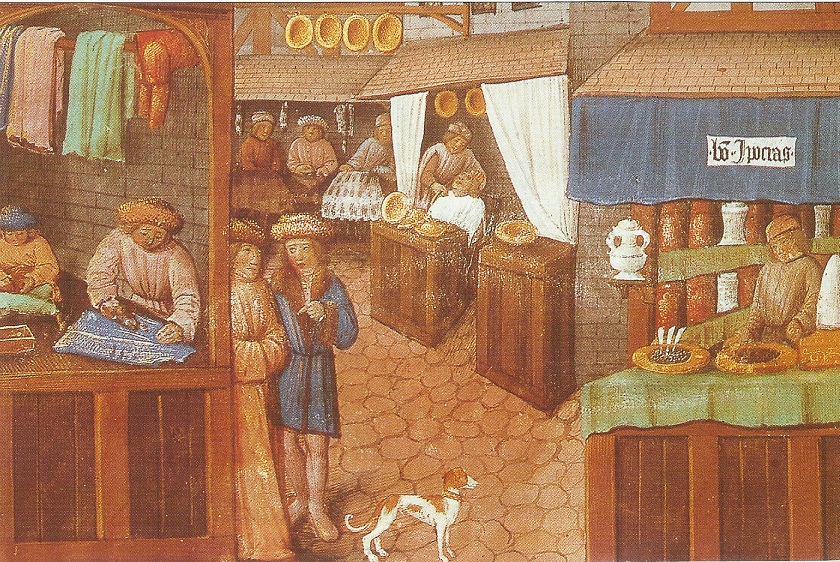
The Bustling Towns

Introduction

A town street in fourteenth-century France. Compare it to a modern street.
When William conquered England in 1066, only half a dozen places had more than 4,000 people living in them. During the Middle Ages, however, many towns grew up in England. By 1500, Norwich, Bristol and Newcastle had more than 10,000 inhabitants and London probably had 50,000.
You would have found a walk through the narrow streets of a town very exciting. Wealthy people were dressed in brightly coloured clothes. The poor wore dull brown and black 5 tunics. Carts piled with wood squeezed past mules loaded with cloth or vegetables. There was constant noise. The town crier competed, not only with the shouts of shopkeepers and street-sellers (trading laws in the Middle Ages forbade shopkeepers to solicit customers unless they were walking in front of their shop, but street sellers could shout out their wares), but also with the church bells, and with the huge shop signs which squeaked in the wind.
However, towns were cruel and violent places. People laughed at beggars and cripples. A quarrel over a road accident or litter often ended in a fight, and in somebody's death.
At 8 p.m. a bell rang for curfew, when everyone was supposed to shut up their houses and go to bed.
Study this webpage, then answer the question sheet by clicking on the 'Time to Work' icon at the top of the page.
Links:
The following websites will help you research further:
Medieval towns:
• KS3 BBC Bitesize on
medieval warfare
1 The Streets of London
This anonymous 15th century poem comes from The London Lickpenny, the tale of a poor Kentish farmer's trip to present his case to the courts in London ... where he is thoroughly cheated. It includes this description of London streets.
Mouse-over the words in brown for their meaning.
Then to London I did me hie;
Of all the land it bears the prize.
'Hot peascods,' one began to cry;
'Strawberries ripe,' others ask me and advise.
One bade me come near and buy some spice;
Pepper and saffron they me plead.
But for lack of money I could not speed.
Then to
Cheapside I went on,
Where many people I saw to stand.
One offered me velvet, silk and linen;
Another took me by the hand,
'Here is Paris thread, the finest in the land.'
I never was used to such things indeed,
And lacking money, I could not speed.
Then I went out by London
Stone,
Through all Candlewick Street;
Drapers much cloth offered me anon.
Then I met one who cried, 'Hot sheep's feet.'
One cried, 'Fish'; 'Rushes green,' another gan greet.
One bade me buy a hood to cover my head;
But for lack of money I could not speed.
Then I hied me into
Eastcheap;
One cried, 'Ribs of beef and many a pie.'
Pewter pots they clattered on a heap;
There was harp, pipe and minstrels there.
'Yes, by God!" "Nay, by God"!' some began to cry;
Some sang of St Julian for their meed,
But for lack of money I could not speed.
Then to Westminster gate I presently went,
When the sun was at high prime.
Cooks on me they were all intent,
And offered me bread, with ale and wine;
Ribs of beef, both fat and full fine;
A fair cloth they began for to spread,
But lacking money I could not be sped.